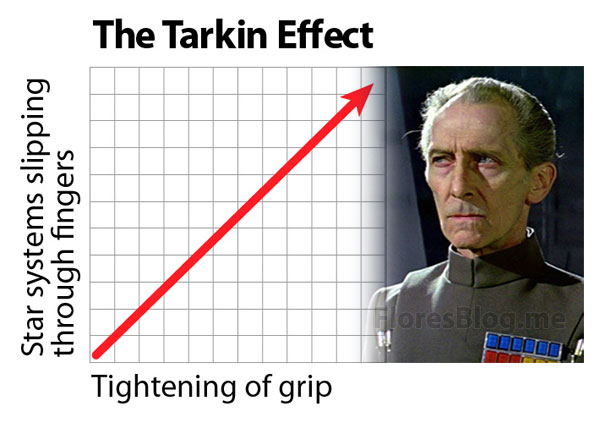"All created things are impermanent."
Seeing this with insight,
One becomes disenchanted with suffering.
The Dhammapada (277, translated by Gil Fronsdal)
Groundlessness is a really interesting concept. Although we know its truth, we ignore and resist it. That is, we know from our own experience that everything changes, and that trying harder to seek solidity only causes more anxiety and stress. The great philosopher Princess Leia once described it thus:
"The more you tighten your grip, Tarkin, the more star systems will slip through your fingers."We work very hard to try to get some ground underneath us and we fear uncertainty. It's unclear to me why this is, however. Almost everyone already has at least two clear insights. First, we know that we become more anxious when we worry about things changing, and we produce more suffering when we try to hold on tighter. Many people have seen this in romantic relationships - as one partner becomes clingier and tries to hold on tighter, it causes both people distress and ultimately damages the relationship. Second, we know that we don't really know what will happen, and many times that's the most fun. For example, I am planning a trip to France with my daughter - we have never been, and she is super excited because she doesn't know what it will be like.
Princess Leia to Grand Moff Tarkin
We therefore know from our own experience that trying to hold onto certainty is distressing and that uncertainty can be pleasant. So why do we fight it so much?
One reason is that this is, of course, an oversimplification. Solidity can also be fun (at least for a while) and uncertainty can also be distressing. Perhaps what we fear isn't really the uncertainty per se. Perhaps what we really fear is the emotions we have to open ourselves to when we don't know what to expect. This is why some people seem to be much more content to be unhappy all the time, holding on to a limited world view that everything sucks. At least with this approach they can know what to expect and are rarely disappointed. They have not yet become "disenchanted with suffering," and they work hard to make the ground of their lives as solid as possible.
The irony of this approach is that even the ground is not stable. Even if you were to sit as still as possible on the cement, the earth is spinning at about 1,038 miles per hour, and the earth is moving around the sun at 67,108 mph, and our solar system is moving around the galaxy at about 514,000 mph, and the galaxy is moving around the local galactic cluster at about 89,000 mph, and the local cluster is moving around the local supercluster at about 1,342,000 mph. That means that sitting completely still, you are still moving at about 2 million miles per hour. Furthermore, the ground itself is groundless...it is constantly changing in shape and constitution based on changing temperatures, weather, use, friction, decay, etc.
What if we stepped into the stream of uncertainty without resistance? Pema Chodron says, "Something about 'nothing solid' begins to equal freedom....This moving away from comfort and security, this stepping out into what is unknown, uncharted, and shaky -- that's called liberation" (Comfortable with Uncertainty, pp. 43-44). Ralph Waldo Emerson put it this way:
"People wish to be settled. Only as far as they are unsettled is there any hope for them."



